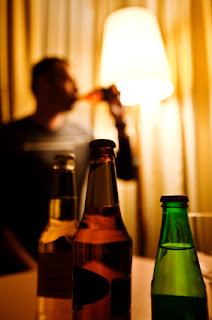It’s a matter of the “chicken and the egg”--what comes first, alcoholism or depression? Do people turn to alcohol because they are depressed, or are they depressed because of alcohol? Regardless of what came first, it is clear that there is a connection between alcohol and depression. The question is how to remedy it.
From Depression to Alcohol
People abuse alcohol to handle a problem. They may drink to ease stresses at work, to handle nervousness in social settings, or to get rid of unwanted feelings or memories. Even using alcohol to “have a good time” raises the question, why can’t you have a good time without it? When a person is depressed, alcohol temporarily remedies this problem. Alcohol works on the central nervous system as a depressant, causing sadness, guilt, and feelings of unworthiness to melt away. At the same time, it elevates mood, causing euphoria. The trouble with alcohol, however, is that disappointing modifier: “temporarily”. After the effects of drinking wear off, depression returns. Not only that, it is often more pronounced than before. After the natural systems of the body have been bypassed, it becomes dependent upon alcohol to feel good. The hormones and other biochemical processes necessary to provide energy and a positive outlook are completely drained, leaving one feeling worse than before. More often than not, the user returns to alcohol to address this problem. Again, he feels good temporarily--only to find himself worse off the following morning. And so the pattern continues.The Facts on Alcoholism
 Alcoholism can begin without the impetus of depression. A person may lead a perfectly cheerful life but turn to alcohol because his friends do it, because the culture promotes it, or to address a different problem such as stress or anxiety over a particular area of life.
As was explained above, alcohol use creates dependency as the body no longer acts independently--it begins to rely on alcohol for various physical processes. Additionally, alcohol burns nutrients that monitor mood, sleep, energy, and so on. B vitamins are some of these nutrients. When B vitamins are depleted, a person can experience symptoms of depression. He may feel tired and drained; he will have trouble sleeping; and he may feel irritated or melancholy. Sometimes the body can become so deficient in B vitamins that it is stricken by a condition known as delirium tremens--an acute physical problem common among alcoholics that includes tremors, profuse sweating, fever, chills, body aches, and even seizures.
Alcoholism can begin without the impetus of depression. A person may lead a perfectly cheerful life but turn to alcohol because his friends do it, because the culture promotes it, or to address a different problem such as stress or anxiety over a particular area of life.
As was explained above, alcohol use creates dependency as the body no longer acts independently--it begins to rely on alcohol for various physical processes. Additionally, alcohol burns nutrients that monitor mood, sleep, energy, and so on. B vitamins are some of these nutrients. When B vitamins are depleted, a person can experience symptoms of depression. He may feel tired and drained; he will have trouble sleeping; and he may feel irritated or melancholy. Sometimes the body can become so deficient in B vitamins that it is stricken by a condition known as delirium tremens--an acute physical problem common among alcoholics that includes tremors, profuse sweating, fever, chills, body aches, and even seizures.Natural Remedies for Depression
While depression is often treated with medication, a number of studies show that this involves risks, including the risk of addiction. To combat depression, there are a number of alternative solutions. • Exercise, which increases energy and elevates mood. • Changes in diet, including more fruits and vegetables, which contain minerals and other valuable nutrients. • Lifestyle changes, such as changing one’s environment or friends to those that make one happy. If you suffer from alcoholism, it is important to get treatment and become sober in order to address any problems with depression.Source:
http://www.ipass.net/a1idpirat/Alcoholism-Depression.html


No comments:
Post a Comment